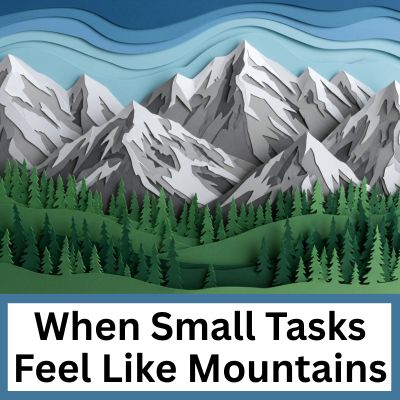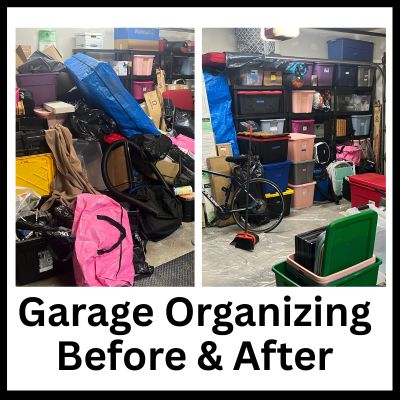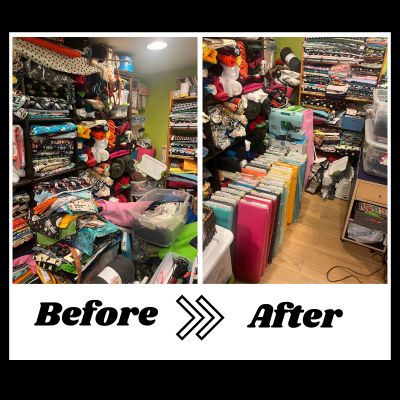Factors Associated with Disorganization, Part 2
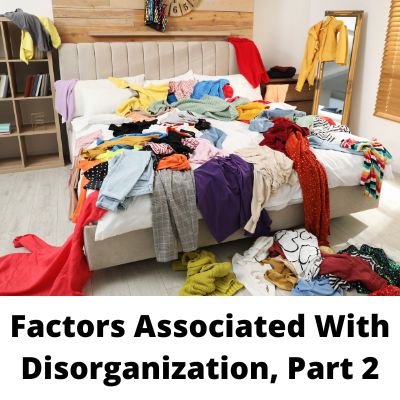
Last week I wrote a post about a bunch of different reasons people are disorganized. Neurologically-based conditions, environmental factors, lack of skills, personal choices, communication problems, complicated systems (or lack of systems), addictive tendencies, mental health issues, and transitions, are only about half of the reasons why people are disorganized. In this post, I’ll cover the second half of reasons why people are disorganized. There are SO MANY reasons!! If you’re disorganized, don’t fret. Sometimes just identifying the reason you are disorganized is all it takes to making some serious headway towards getting organized.
Aging Issues
As we get older, people may have physical limitations that make it hard to get organized. Even if you’ve taken the best care of your body, it may not work as well as it did when you were younger. There is no shame in getting help. In fact, getting help may help you prolong your independence by helping you avoid a potential accident. Certain medications can impact physicality and motivation levels. Age related cognitive problems can also be a barrier to staying organized.
Beliefs
This is probably one of the biggest reasons why people have trouble with organization. After years and years of being labeled as “disorganized”, it can be really hard for people to shake that limiting belief. I have a special Belief Releasing Statement that I use with my clients who want to replace a negative belief with a positive one. It really works! Beliefs shape attitudes, so when someone has a pessimistic outlook on whether they can become organized or not, it impacts their attitudes and habits. People can really get stuck when they are afraid of making a mistake or being judged about their level of organization.
Physical Challenges
Obviously, having impaired mobility makes organizing really hard. It’s difficult to move around the house, challenging to go to the store to buy organizing supplies, and almost impossible to take donations to the thrift store. People with impaired mobility often need to keep things at a lower level so they can reach them, so their storage options are basically cut in half. Fatigue or sleep disorders prevent energy levels from being where they need to be to get stuff done. Poor vison can make organizing really frustrating, but also limits storage options because they need to have fewer items so that spaces don’t get too crowded. Dysphasia is a language disorder where the parts of the brain that control speech and understanding written and spoken language don’t work correctly. It makes communicating to others in the household very difficult.
Learning Styles or Modalities
When you’re creating new systems in your home, how do you learn how to use them? Or how do you teach others how to use them? Some people learn well with visual cues. Others need to have things verbally explained. Kinesthetic learners figure things out by doing. Usually, a combination of learning cues is the best way to teach something. It’s important to remember to have compassion with yourself and others in your household when you are learning/teaching new organizing routines. When decluttering, Marie Kondo teaches her readers to touch everything to see if it sparks joy or not. I personally find this method very effective for myself, but people with tactile sympathy get re-attached to every item they touch. If you’re someone who has strong tactile sympathy, have your organizer or a friend hold items up and ask you if you want them without you touching them yourself. Holistic thinking can make it hard for people to get organized because holistic thinkers can easily link several ideas together. Determining when one idea/task/category starts and stops is a very gray line for holistic thinkers. I personally have a good balance of holistic and linear thinking, so I’m able to identify and empathize with both holistic and linear thinkers.
Perfectionism
This is another huge reason why people are disorganized. It can be hard for some people to get started organizing if they know they don’t have enough time or resources to get it done perfectly. They may also leave an organizing project unfinished because they don’t want to make a mistake. Someone with perfectionistic tendencies may acquire more than necessary because they want to make sure they always have “the thing” (the right band-aid, the right shoes, the right snack etc…). I personally love to be prepared, so I can identify with wanting to make sure to have the right stuff.
Life Crises
Health emergencies, death of loved ones, job losses, and family crises can pop up unexpectedly. Time and energy get diverted to focus on the problem. Cleaning tasks get put off because there are more important things to deal with. Grief and other emotions can make it hard for people to feel like they have any control over the things they actually can control in their lives. The parasympathetic nervous system gets overworked, and soon the house looks the way you feel- fried!
Attachments to Possessions
Some people have strong sentimental urges to keep items around because they love them and help them remember positive memories. Other people have attachments to their possessions as a way of avoiding feelings of guilt. They may feel wasteful buying things and never using them or donating them even when they’re still useful. They also might have been given items as gifts and don’t want to upset the gift giver. PSA- if you give someone a gift, please give it freely, without any strings attached or contracts that bind them into keeping the gift forever. This will allow you to free yourself from your own attachments, and will also send a ripple effect into the universe to help give others permission to free themselves from attachments as well.
Learning Differences
Auditory processing disorder (APD) isn’t a learning disability or hearing loss, but it’s when someone’s brain has a hard time hearing sounds in the usual way. If someone says, “put the mail on the table”, to someone with APD, it could sound like, “put the snail in the stable”. People with APD also have a hard time talking to other people, following conversations, knowing where sounds came from, remembering spoken instructions, and understanding what other people are saying. Having APD can make communicating household chores and systems very difficult. Non-verbal learning disability (NVLD) gives people trouble with non-verbal social skills. Motor and visual-spatial skills are also impacted. Someone with NVLD may have great verbal skills, but because their motor and spatial skills are impaired, it makes organizing hard.
Ineffective Beliefs About Possessions
Once you buy something at the store and bring it home, the value drops significantly. Unless it’s something that is highly collectable, trying to re-sell it when you’re done with it is usually a lost cause. For the amount of time it takes to list the items, wait for someone to be interested in your items, coordinate with potential buyers for pickup or packing something to be shipped (and paying for postage), it’s rarely worth the effort. But because someone paid a lot of money for something (a set of China, kid’s toys, college text books), they often end up keeping them in their homes well after they have a need for them anymore. It’s important to learn to realistically value the resale price of items so that you can let them go. Sometimes, possessions are seen as part of someone’s identity. Hobby supplies, work attire, and books are common items that are kept so that someone can keep hold of a fleeting identity.
Information-Processing Deficits
Sometimes it’s hard to make decisions because of cognitive deficits. If someone is easily distracted, it can make it very hard to follow through completing tasks. Someone may walk into a room to put clothes away, but then they decide they need to vacuum and change the sheets, and completely forget about why they walked into the room in the first place. Memory deficits can make it difficult to remember where you put something, or that you have a load of clothing in the washer. Categorization difficulties make it hard to organize because it’s hard to sort like-items together.
Emotional and/or Behavioral Patterns
Procrastination and avoidance can come from a desire to rebel. Someone may feel like they’ve been “too good” (working a lot, exercising regularly, eating right) that they need an outlet to “be bad” so they procrastinate doing their household tasks. On the other hand, some people avoid organizing and decluttering because they don’t want to have to face traumatic memories or less than stellar times in their lives. Procrastination and avoidance can happen for all kinds of reasons! Emotional reactivity can be a reason why people acquire or save excessive objects in their home.
If you haven’t already read last weeks’ blog post, Factors Associated with Disorganization, Part 1, check it out! If you feel inspired, drop me a line and let me know why you think you have challenges with disorganization.
Source: ICD Fact Sheet 004
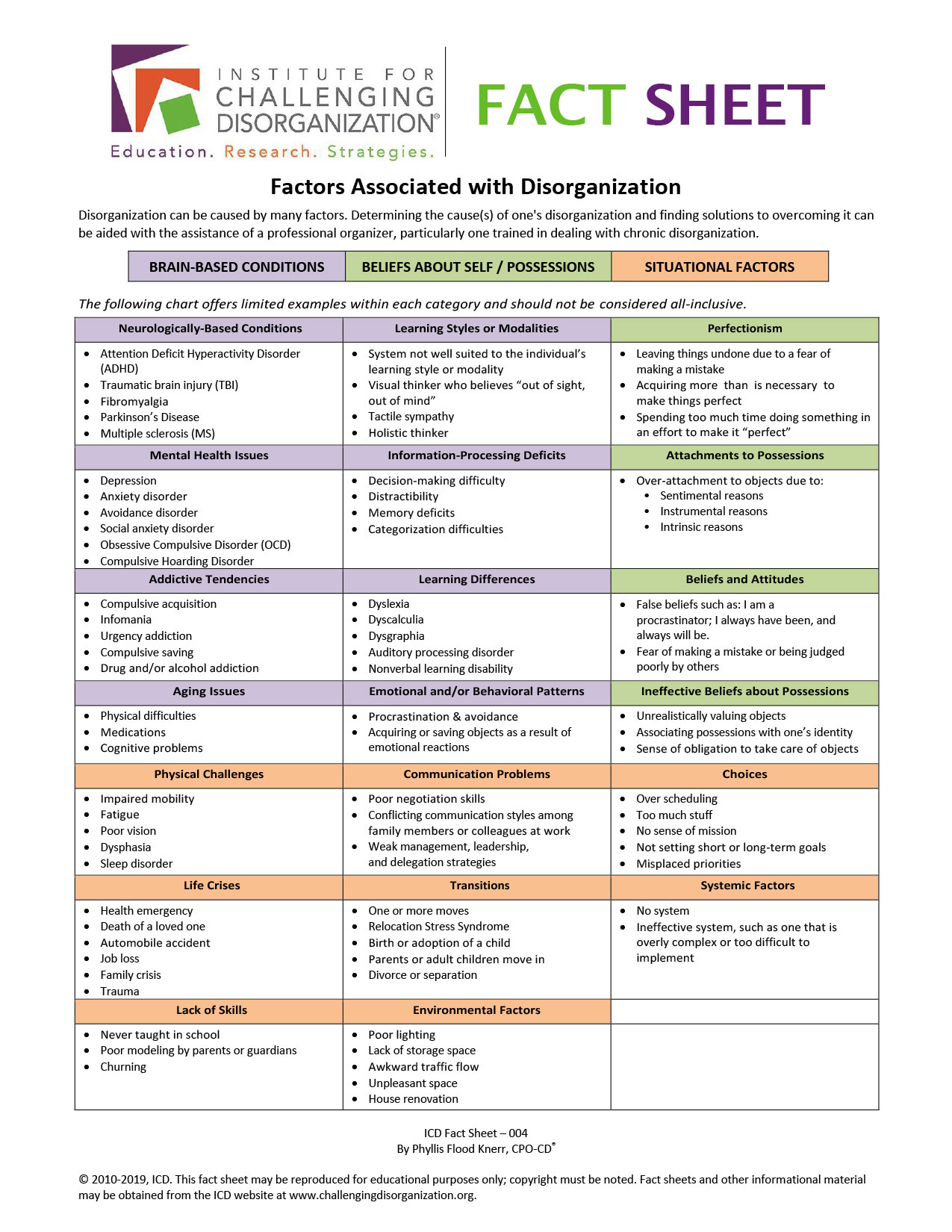

By Jean Prominski, Certified Professional Organizer
Don’t forget to sign up for my organizing classes here
Download my free 5 week journal The Seattle Sparkle Method to Get Organized and Stay Organized
Sign up for my free 4 Day Color to Declutter Challenge.
Become part of a like-minded community by joining my Facebook Group, Declutter and Organize with Seattle Sparkle.
Ready to book a consultation? Complete this form.
For artwork to energize your home, order through jeanprominski.com or on Etsy.


